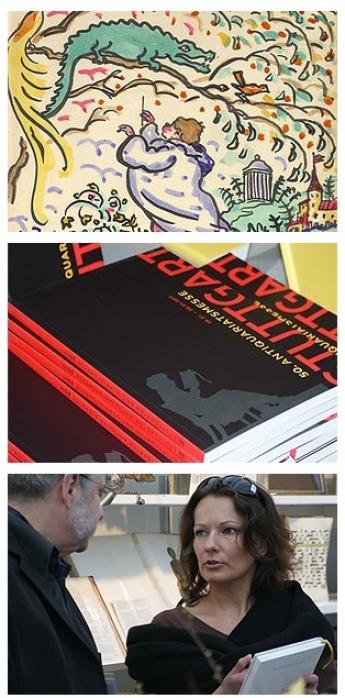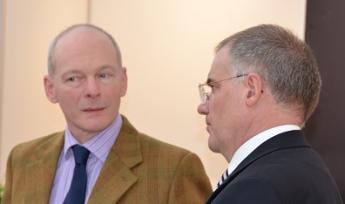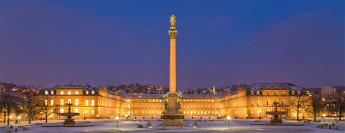Actualités Verband Deutscher Antiquare e.V.
Interview Götz Kocher-Benzing & 56th Stuttgart Antiquarian Book Fair 2017



No clicks, no pixels - but “the real thing”
Before the opening of the 56th Stuttgart Antiquarian Book Fair, we spoke to Götz Kocher-Benzing of Stuttgarter Antiquariat and asked why Stuttgart is still such an attractive place to buy and browse and trade in antiquarian books.
The Stuttgart Antiquarian Book Fair is the most important antiquarian book fair of the German speaking countries. As longstanding exhibitor, how would you describe the fair?
I believe the Stuttgart fair still offers the highest quality and greatest flair in the German market. The Stuttgart Antiquarian Book Fair, together with the ANTIQUARIA book fair in Ludwigsburg occurs right at the beginning of the year when the trade is still slow, and the fair is very attractive for both, collectors and dealers.
Has the Stuttgart fair and its clientele changed in recent years?
In my opinion, the fair benefits from a larger variety of dealers these days. Until the late 90’s, for over three decades, one would always find the same exhibitors. Young colleagues had almost no chance to find a space. ILAB affiliated dealers also had to be members of the German association VdA (Verband der Antiquare) to be allowed to exhibit. But as a result of the increasing number of fairs and exhibitions worldwide since the millennium, the competition has been greater and the fair started to open up.
Sales are now often generated on the internet, but collectors as well as dealers and librarians still value the personal interaction with the exhibitors and in particular the experience of seeing and handling the exhibited stock. No clicks, no pixels - but “the real thing”.
Your father, Dr. Frieder Kocher-Benzing was one of the founding fathers of the Stuttgart fair in 1961. Since then, the antiquarian book trade has changed a great deal. What has not changed?
When my father opened his antiquarian bookshop in 1959, there were still two different associations due to different views in the trade. These associations were united in 1960. My father was part of the committee of this “new” association and later president. In 1961, my father together with his colleagues from Stuttgart, Fritz Eggert und Fritz Neidhardt, had the idea of hosting an antiquarian book fair in Germany, much guided by the examples of London and New York and the first fair opened with twenty exhibitors.
Our trade has changed a lot, bookshops are closing, a lot of trading is done online and customers do their own research on the Internet. But maybe also because of the Internet and the information that is now available online, we often find new and very young bibliophiles who want to collect. Numbers might be smaller than in the 1950’s and 1960’s after WWII when the West-German economy was growing, but they still exist.
Your firm will launch a special catalogue at the Stuttgart fair to commemorate the 500 year celebrations of Luther and the reformation this year in Germany. Would you like to give us a brief summary about it?
My father originally specialised in books on the reformation and I have tried to continue with this over the past twenty years, as much. The opportunity to publish a Jubilee catalogue arose when a longstanding customer offered to sell his collection. The focal point of the collection, which encompasses seventy five items from the years 1495 to 1566, is the documentation of the changing society at the beginning of Early Modern History that was strongly influenced by the reformation. Included are books and documents from the time before the reformation that are already urging change (i.e. the criticism of the sale of indulgences or of the papacy) and most of the important works of Luther and other reformers as well as the most important publications on the “Bauernkrieg” (Peasants' Revolt of 1524-1525).
Stuttgart is a major book city in Germany. Many important German publishing houses are based here. Libraries, bookshops, literature houses and cultural centres offer great variety. Universities run degrees in bookselling and production, publishing and librarianship. As a “Stuttgarter”, how would you describe your city and what should a visitor explore besides the fair?
For many of my colleagues who know Stuttgart only at this time of the fair - in winter, it is a grey German metropole as many others. But when these colleagues come back at a nicer time of year, they are often surprised: they find vineyards in the middle of town, culinary highlights, beautiful residential areas with impressive views and greenery all around, as well as a rich and full cultural calendar. It’s not that bad to live here!
Mr. Kocher-Benzing, thank you very much for the interview. We wish you and your colleagues a succesful fair.
To find out more about the 56th Stuttgart Antiquarian Book Fair, please go here.
The Stuttgart Antiquarian Book Fair is organised by the German association Verband der Antiquare and officially sanctioned by the International League of Antiquarian Booksellers (ILAB).
It is the first major event of the bibliophile year, attracting dealers and collectors from all over the world to the elegant "Kunstverein" in the heart of Stuttgart. This year, 72 exhibitors from Germany, Great Britain, the United States, Switzerland, Austria, France and the Netherlands will show rare and valuable medieval manuscripts, books, autographs, and modern prints.
Website: www.stuttgarter-antiquariatsmesse.de
